Page 1 of 352 pages 1 2 3 > Last »
Actor dressed as John Wesley
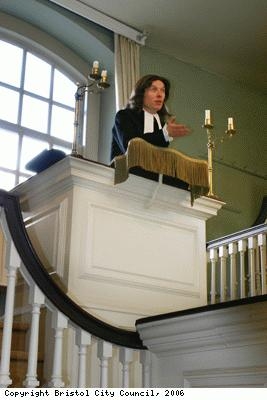
Description:
The New Room, John Wesley’s Chapel, Bristol. Founding date 1739.
Actor (Mark Topping) dressed as John Wesley preaching from the pulpit in John Wesley’s Chapel, in Bristol, where Wesley preached against slavery. He was a campaigner for the abolition of the slave trade.
Creator: David Emeney
Date: 2004
Copyright: Copyright Bristol City Council
John Wesley’s room
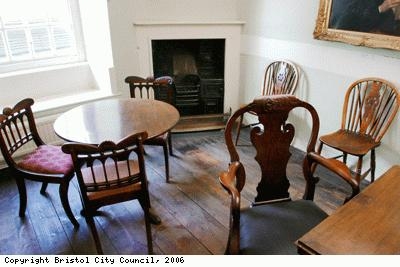
Description:
John Wesley’s New Room, Bristol.
John Wesley’s room showing table, chairs and fireplace with desk in the foreground.
John Wesley was the founder of the Methodist Church. He was an Abolitionist and a preacher, who wrote and preached against the slave trade.
Creator: David Emeney
Date: 2004
Copyright: Copyright Bristol City Council
Mention of Silas Told
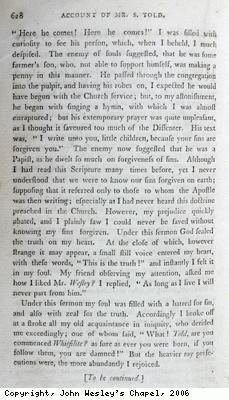
Description:
John Wesley’s New Room, Bristol.
The Arminnian Magazine 1783. Page 99, mentioning the sailor-turned-Methodist, Silas Told.
Silas Told was born in Bristol in 1711. He was educated for free at Colston’s School as a charity pupil.
At the age of 14, he was apprenticed to be a sailor.
He suffered beatings and abuse along with short rations on board the ship The Prince of Wales under his master Captain Moses Lilly.
He later suffered even more under slave captain Timothy Tucker. Told could read and write; unlike most sailors of his day. This time he kept a diary of his ordeal.
On his return to England, he became a Methodist, converted to the religion by John Wesley, a Bristol preacher.
Shortly after his death, his book The Life and Dealings of God with Silas Told was published in 1786 by his Methodist friends; to spread the story of his conversion to the religion and to show the cruelties of the slave trade, which many religious people were against.
The book shows the terrible suffering that the sailors, as well as those enslaved on board, could experience at the hands of the officers and captains.
John Wesley was the founder of the Methodist Church. He was an Abolitionist and a preacher, who wrote and preached against the slave trade.
Date: c 1700's
Copyright: Copyright, John Wesley's Chapel
John Wesley preaching
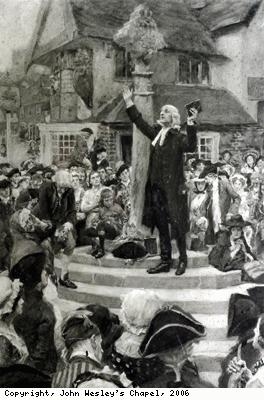
Description:
John Wesley’s New Room, Bristol.
A print of the painting, John Wesley preaching from a market cross.
Original painting, by W Hatherall, RA, (1909), is at Wesley’s Chapel, London.
John Wesley was the founder of the Methodist Church. He was an Abolitionist and a preacher, who wrote and preached against the slave trade.
Creator: W Hatherall, RA
Date: c 1900's
Copyright: Copyright, John Wesley's Chapel
Mention of Silas Told
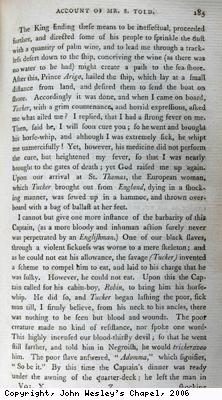
Description:
John Wesley’s New Room, Bristol.
The Arminnian Magazine 1783. Page 99, mentioning the sailor-turned-Methodist, Silas Told.
Silas Told was born in Bristol in 1711. He was educated for free at Colston’s School as a charity pupil.
At the age of 14, he was apprenticed to be a sailor.
He suffered beatings and abuse along with short rations on board the ship The Prince of Wales under his master Captain Moses Lilly.
He later suffered even more under slave captain Timothy Tucker. Told could read and write; unlike most sailors of his day. This time he kept a diary of his ordeal.
On his return to England, he became a Methodist, converted to the religion by John Wesley, a Bristol preacher.
Shortly after his death, his book The Life and Dealings of God with Silas Told was published in 1786 by his Methodist friends; to spread the story of his conversion to the religion and to show the cruelties of the slave trade, which many religious people were against.
The book shows the terrible suffering that the sailors, as well as those enslaved on board, could experience at the hands of the officers and captains.
John Wesley was the founder of the Methodist Church. He was an Abolitionist and a preacher, who wrote and preached against the slave trade.
Date: 1787
Copyright: Copyright, John Wesley's Chapel
Mention of Silas Told
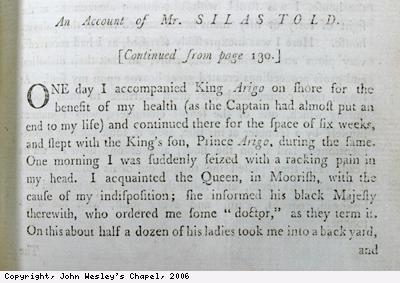
Description:
John Wesley’s New Room, Bristol.
The Arminnian Magazine 1783. Page 99, mentioning the sailor-turned-Methodist, Silas Told.
Silas Told was born in Bristol in 1711. He was educated for free at Colston’s School as a charity pupil.
At the age of 14, he was apprenticed to be a sailor.
He suffered beatings and abuse along with short rations on board the ship The Prince of Wales under his master Captain Moses Lilly.
He later suffered even more under slave captain Timothy Tucker. Told could read and write; unlike most sailors of his day. This time he kept a diary of his ordeal.
On his return to England, he became a Methodist, converted to the religion by John Wesley, a Bristol preacher.
Shortly after his death, his book The Life and Dealings of God with Silas Told was published in 1786 by his Methodist friends; to spread the story of his conversion to the religion and to show the cruelties of the slave trade, which many religious people were against.
The book shows the terrible suffering that the sailors, as well as those enslaved on board, could experience at the hands of the officers and captains.
John Wesley was the founder of the Methodist Church. He was an Abolitionist and a preacher, who wrote and preached against the slave trade.
Date: 1787
Copyright: Copyright, John Wesley's Chapel
Mention of Silas Told
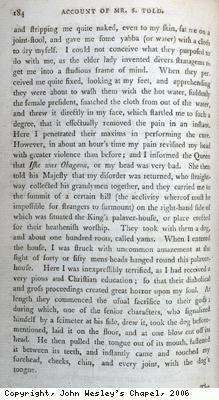
Description:
John Wesley’s New Room, Bristol.
The Arminnian Magazine 1783. Page 99, mentioning the sailor-turned-Methodist, Silas Told.
Silas Told was born in Bristol in 1711. He was educated for free at Colston’s School as a charity pupil.
At the age of 14, he was apprenticed to be a sailor.
He suffered beatings and abuse along with short rations on board the ship The Prince of Wales under his master Captain Moses Lilly.
He later suffered even more under slave captain Timothy Tucker. Told could read and write; unlike most sailors of his day. This time he kept a diary of his ordeal.
On his return to England, he became a Methodist, converted to the religion by John Wesley, a Bristol preacher.
Shortly after his death, his book The Life and Dealings of God with Silas Told was published in 1786 by his Methodist friends; to spread the story of his conversion to the religion and to show the cruelties of the slave trade, which many religious people were against.
The book shows the terrible suffering that the sailors, as well as those enslaved on board, could experience at the hands of the officers and captains.
John Wesley was the founder of the Methodist Church. He was an Abolitionist and a preacher, who wrote and preached against the slave trade.
Date: 1787
Copyright: Copyright, John Wesley's Chapel
Mention of Silas Told
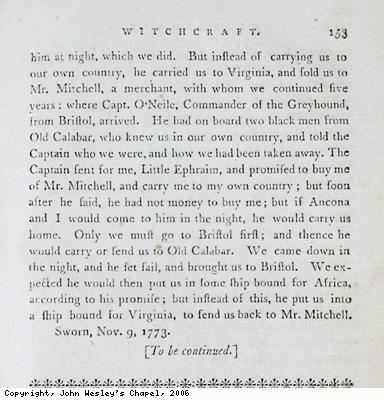
Description:
John Wesley’s New Room, Bristol.
The Arminnian Magazine 1783. Page 99, mentioning the sailor-turned-Methodist, Silas Told.
Silas Told was born in Bristol in 1711. He was educated for free at Colston’s School as a charity pupil.
At the age of 14, he was apprenticed to be a sailor.
He suffered beatings and abuse along with short rations on board the ship The Prince of Wales under his master Captain Moses Lilly.
He later suffered even more under slave captain Timothy Tucker. Told could read and write; unlike most sailors of his day. This time he kept a diary of his ordeal.
On his return to England, he became a Methodist, converted to the religion by John Wesley, a Bristol preacher.
Shortly after his death, his book The Life and Dealings of God with Silas Told was published in 1786 by his Methodist friends; to spread the story of his conversion to the religion and to show the cruelties of the slave trade, which many religious people were against.
The book shows the terrible suffering that the sailors, as well as those enslaved on board, could experience at the hands of the officers and captains.
John Wesley was the founder of the Methodist Church. He was an Abolitionist and a preacher, who wrote and preached against the slave trade.
Date: 1783
Copyright: Copyright, John Wesley's Chapel
Mention of Silas Told
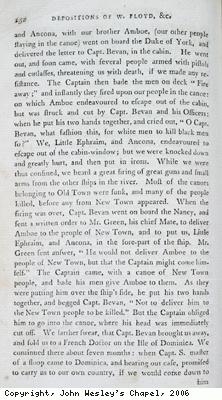
Description:
John Wesley’s New Room, Bristol.
The Arminnian Magazine 1783. Page 99, mentioning the sailor-turned-Methodist, Silas Told.
Silas Told was born in Bristol in 1711. He was educated for free at Colston’s School as a charity pupil.
At the age of 14, he was apprenticed to be a sailor.
He suffered beatings and abuse along with short rations on board the ship The Prince of Wales under his master Captain Moses Lilly.
He later suffered even more under slave captain Timothy Tucker. Told could read and write; unlike most sailors of his day. This time he kept a diary of his ordeal.
On his return to England, he became a Methodist, converted to the religion by John Wesley, a Bristol preacher.
Shortly after his death, his book The Life and Dealings of God with Silas Told was published in 1786 by his Methodist friends; to spread the story of his conversion to the religion and to show the cruelties of the slave trade, which many religious people were against.
The book shows the terrible suffering that the sailors, as well as those enslaved on board, could experience at the hands of the officers and captains.
John Wesley was the founder of the Methodist Church. He was an Abolitionist and a preacher, who wrote and preached against the slave trade.
Date: 1783
Copyright: Copyright, John Wesley's Chapel
Mention of Silas Told

Description:
John Wesley’s New Room, Bristol.
The Arminnian Magazine 1783. Page 99, mentioning the sailor-turned-Methodist, Silas Told.
Silas Told was born in Bristol in 1711. He was educated for free at Colston’s School as a charity pupil.
At the age of 14, he was apprenticed to be a sailor.
He suffered beatings and abuse along with short rations on board the ship The Prince of Wales under his master Captain Moses Lilly.
He later suffered even more under slave captain Timothy Tucker. Told could read and write; unlike most sailors of his day. This time he kept a diary of his ordeal.
On his return to England, he became a Methodist, converted to the religion by John Wesley, a Bristol preacher.
Shortly after his death, his book The Life and Dealings of God with Silas Told was published in 1786 by his Methodist friends; to spread the story of his conversion to the religion and to show the cruelties of the slave trade, which many religious people were against.
The book shows the terrible suffering that the sailors, as well as those enslaved on board, could experience at the hands of the officers and captains.
John Wesley was the founder of the Methodist Church. He was an Abolitionist and a preacher, who wrote and preached against the slave trade.
Date: 1783
Copyright: Copyright, John Wesley's Chapel

